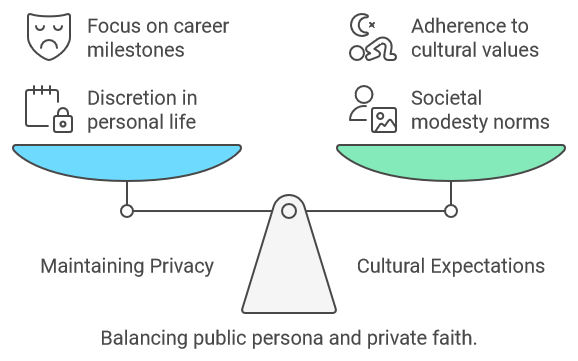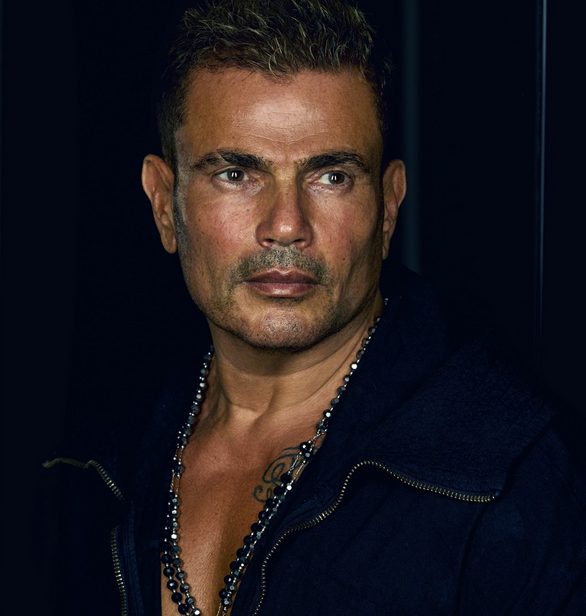Amr Diab, the iconic Egyptian singer often referred to as the “King of Arabic Pop” or the “Father of Mediterranean Music,” was born into a Muslim family in Port Said, Egypt. Throughout his illustrious career, Diab has been known for blending traditional Arabic melodies with Western rhythms, which helped popularize Arabic music globally. His personal background and cultural identity are closely tied to his Egyptian and Muslim heritage.
Though Diab is primarily celebrated for his musical innovations and global success, his religion is an important aspect of his personal life. Like many public figures from the Arab world, he maintains a private approach to discussing personal matters such as faith, focusing instead on his music and artistic contributions. However, his Muslim faith is a known and acknowledged part of his identity within the context of Egypt and the broader Arab world.
Amr Diab, widely recognized as the “King of Arabic Pop,” has been a revolutionary figure in the Middle Eastern music industry for decades. His seamless blend of traditional Arabic sounds with contemporary Western rhythms has redefined Arabic pop music, earning him global recognition. With over 30 albums, numerous awards, and countless international hits, Diab has captivated audiences far beyond the Arab world, making him one of the most influential artists in the region.
Overview of the Topic:
While Amr Diab’s music and innovation have made him a household name, his personal life, including his religious background, remains an intriguing aspect of his identity. This blog seeks to answer the question: What is Amr Diab’s religion? Understanding his cultural and religious roots provides a deeper appreciation of how his heritage influences his music, even though Diab is known to keep his personal beliefs out of the spotlight.
Amr Diab’s Background
Early Life:
Amr Diab was born on October 11, 1961, in Port Said, Egypt, a city known for its rich cultural heritage and proximity to the Suez Canal. Raised in a traditional Egyptian Muslim household, Diab’s early life was steeped in the cultural and religious values of his surroundings. His father, a government employee, encouraged young Diab to pursue music, fostering his early passion for singing and performance. As a Muslim growing up in Egypt, Diab’s identity was undoubtedly shaped by the customs and traditions of his community.
Cultural and Religious Influences:
Growing up in a predominantly Muslim country where religion plays a significant role in daily life, it is likely that Islam has had an influence on Amr Diab’s worldview and possibly his approach to music. While his songs rarely touch on explicitly religious themes, his identity as a Muslim and an Egyptian has likely influenced the themes of love, culture, and unity that pervade his music. Diab’s ability to stay grounded in his cultural roots while also appealing to a global audience reflects the balance between tradition and modernity—a dynamic that many Middle Eastern artists navigate.
His Music and Its Relationship to His Identity
Blending Western and Arabic Music:
Amr Diab’s music is renowned for its pioneering blend of Western and Arabic styles, a hallmark of his sound that has won him fans worldwide. Diab successfully fuses traditional Arabic instruments and melodies with Western pop, electronic, and even Latin influences. For example, in his hit song Tamally Ma’ak (2000), he introduced Spanish guitar rhythms into an Arabic love ballad, creating a Mediterranean fusion that captivated global audiences. This fusion mirrors Diab’s own identity—rooted in Egyptian and Muslim heritage, but reaching out to embrace modernity and innovation. His ability to merge both worlds reflects not only his personal navigation between tradition and contemporary culture but also the broader experience of many artists in the Middle East, where cultural modernization meets religious tradition. His music, while not overtly religious, carries the essence of his background, reflecting themes of love, nostalgia, and cultural pride.
Faith and Music:
While Amr Diab’s songs rarely explore explicit religious themes, his identity as a Muslim likely informs aspects of his work, particularly through values that are significant in Islamic culture, such as respect for tradition, family, and love. Though his lyrics often focus on secular themes like romance and longing, Diab’s approach to these subjects is influenced by his Egyptian and Islamic values. For example, his portrayal of love tends to emphasize emotional connection rather than purely physical attraction, aligning with Islamic ideals of respectful relationships. Additionally, Diab has carefully maintained an image of cultural dignity throughout his career, avoiding controversy, which may stem from his adherence to cultural expectations tied to his faith.

Public Persona and Private Faith
Maintaining Privacy:
Throughout his career, Amr Diab has consistently kept his personal life, including his religious practices, private. Unlike some celebrities who might share details about their faith, Diab chooses to keep his religious observances out of the public eye. This discretion is not uncommon among Arab and Muslim public figures, who often maintain a clear boundary between their personal beliefs and professional lives. Diab’s public persona has focused on his music, innovation, and career milestones, leaving little room for discussions about his private religious life. This choice aligns with the general cultural norms in the Arab world, where personal faith is often regarded as a private matter, especially for public figures.
Cultural Expectations:
In Egypt and much of the Arab world, where Islam plays a significant role in shaping societal values, being Muslim is a core part of identity, even for celebrities. While Diab’s music does not overtly focus on religion, the expectations of maintaining modesty, humility, and adherence to cultural norms are ever-present. In this context, Diab’s approach to balancing his music career with his personal faith is emblematic of how many high-profile individuals navigate the expectations of their culture. Even as a pop icon, Diab ensures that his public persona aligns with the values expected of someone from a Muslim-majority country, reflecting not only personal choice but also broader societal and religious expectations.
The Significance of Religion in Arab Celebrities’ Lives
Religion in the Arab World:
In the Middle East, religion plays a central role in shaping cultural, social, and personal identities. Islam, in particular, is deeply woven into the fabric of everyday life, influencing norms, values, and expectations. However, for many Arab celebrities, including musicians, actors, and public figures, their faith is often not the primary focus of their public personas. While most Arab celebrities are Muslim, they tend to keep their religious practices private, focusing instead on their professional achievements. The entertainment industry in the Arab world, especially in countries like Egypt, Saudi Arabia, and Lebanon, often places greater emphasis on cultural heritage, family, and nationalism over explicit religious expression, allowing artists to maintain a balance between faith and modern celebrity life.
Amr Diab’s Approach:
Amr Diab’s approach to religion aligns with this broader trend among Arab celebrities. Though he was raised in a Muslim household and identifies as Muslim, Diab rarely addresses religion directly in his public appearances or music. His focus remains on his innovative musical contributions, which appeal to a global audience while subtly reflecting his cultural background. Diab exemplifies how many high-profile figures in the Arab world navigate the intersection between personal faith and public image. Like many of his peers, he maintains a balance between adhering to cultural expectations, which may stem from his religious roots, and crafting a modern, international appeal. This balance reflects broader social dynamics in the Arab world, where public figures often embody cultural pride and tradition without making religious expression the focal point of their careers.
Conclusion
Summarizing Points:
Amr Diab’s Muslim background is an integral part of his identity, shaping his early life and personal values. However, throughout his career, Diab has chosen to keep his religious practices private, focusing instead on his groundbreaking contributions to music. His ability to blend Arabic and Western musical elements has made him an international icon, allowing him to transcend cultural and religious boundaries while remaining deeply connected to his Egyptian and Muslim heritage. In Diab’s work, there is an underlying respect for tradition, even as he pushes the boundaries of modern Arabic pop music.
Closing Thought:
Understanding Amr Diab’s religion offers a deeper insight into his identity as a cultural icon. However, his enduring legacy is based not solely on his faith but on his exceptional ability to innovate and redefine Arabic music. While his personal beliefs remain private, Diab’s influence on the global music scene highlights the universal appeal of his art, which bridges cultural divides while honoring his roots. Ultimately, it is Diab’s music, not his religion, that has made him a beloved figure both within the Arab world and beyond.
References
- Vogue Man Arabia. “Amr Diab: The King of Arabic Pop.” Vogue Arabia. Available at: https://man.vogue.me
- Facts.net. “Amr Diab Biography: The Father of Mediterranean Music.” Facts.net. Available at: https://www.facts.net
FAQs
- What is Amr Diab’s religion?
Amr Diab is a Muslim, having been raised in a traditional Muslim family in Port Said, Egypt. While his religious background is known, he tends to keep his faith private and does not openly discuss it in the public domain. - Does Amr Diab’s music reflect his religion?
Diab’s music does not explicitly focus on religious themes. However, his Islamic background might subtly influence his values and approach to subjects like love, unity, and tradition. His music emphasizes respect and emotional depth, which may align with Islamic cultural values. - How does Amr Diab balance his religious identity with his international career?
Amr Diab has successfully navigated the space between his Muslim heritage and his international career by focusing on universal themes like love, culture, and personal growth. He has kept his religious practices private while ensuring his public persona respects the cultural norms of his home country and the Arab world. - Why doesn’t Amr Diab talk about his religion publicly?
Like many celebrities in the Arab world, Diab prefers to maintain a distinction between his personal faith and public life. This approach aligns with cultural expectations where public figures often choose to keep their personal beliefs private, focusing instead on their professional achievements. - Is Amr Diab’s music influenced by Western and Arabic cultures?
Yes, Diab’s music is a blend of Western and Arabic styles, incorporating Western pop, electronic, and Latin influences with traditional Arabic music. This fusion mirrors his ability to balance modernity with his cultural roots, making his music appealing to both local and global audiences. - How has Amr Diab influenced Arabic pop music?
Amr Diab is credited with pioneering the Mediterranean style of Arabic pop, blending traditional Arabic melodies with modern Western beats. His groundbreaking approach has made him one of the most influential musicians in the Arab world and beyond. - How important is religion for Arab celebrities like Amr Diab?
Religion plays a significant role in the lives of many Arab celebrities, but it is not always the focal point of their public personas. For many, including Diab, their faith is a private matter, while their public careers focus on cultural and artistic contributions.
